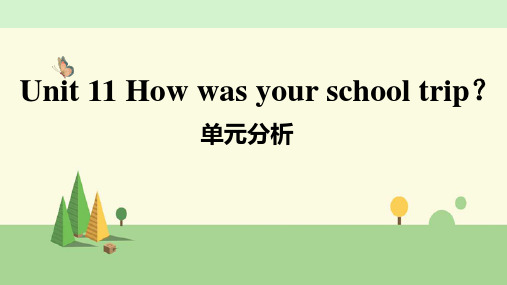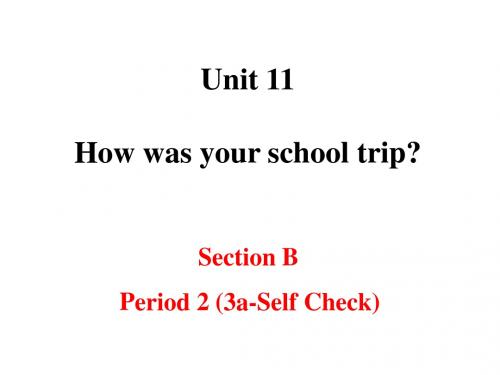Unit_11_How_was_your_school_trip?全单元
- 格式:ppt
- 大小:13.90 MB
- 文档页数:119




初中英语Unit11Howwasyourschooltrip单元教学设计以及思维导图Unit11 How was your school trip适⽤年级七年级下所需时间课内共⽤4课时;课外共⽤2课时主题单元学习概述本单元以“学校旅⾏”为主题,以同学之间谈论各⾃的游览经历为背景,展开多种形式的语⾔训练活动,⽬的是让学⽣逐步学会运⽤⼀般过去时态叙述和询问过去的活动经历。
Section A 部分围绕着学校组织的农场之⾏展开,着重描述了乡村⽣活。
这些内容对于城市学⽣来说会显得陌⽣但很有趣。
本部分的教学重点是与农场和乡村活动相关的动词短语,还有be动词和实义动词的⼀般过去时句式。
教学难点是实义动词⼀般过去时的疑问句正确语序。
另外,不规则动词的过去式对中国学⽣来说也是⼀个难点。
Section B 部分在Section A 所学知识的基础上,围绕单元话题进⼀步丰富“学校旅⾏”的内容,增加⽬标语⾔的输⼊。
该部分的教学重点是让学⽣掌握与旅⾏活动相关的动词短语和描述性形容词,理解阅读篇章中的关于过去经历的叙述。
教学难点是让学⽣运⽤⼀般过去时态完成笔头输出任务。
根据对知识进⾏整合后,本单元的学习可划分为两个专题。
专题⼀:学校旅⾏怎么样?(How was the school trip?)专题⼆:学校旅⾏中做了什么?(What did you do?)专题⼀要求学⽣能正确使⽤be动词的⼀般过去时描述或询问过去的状态;⽽专题⼆则要求学⽣能正确使⽤实义动词的⼀般过去时描述或询问过去发⽣的事情。
两个专题相辅相承,旨在让学⽣运⽤⼀般过去时态完成学校旅⾏⽇记,以达到预期的学习成果。
主题单元规划思维导图主题单元学习⽬标知识与技能:能熟知单元主要内容,掌握相应的语⾔知识(单词、习惯⽤语、语法和功能⽤语)。
能培养良好的听、说、读、写的能⼒,能运⽤适当的评价词对过去的学校旅⾏进⾏评价,能正确使⽤动词过去式对过去的活动进⾏准确的描述。
通过观察、想象、模仿和表演等熟练、⽣动、有创造性地从图⽚或⽂字材料中获取有效信息,拓宽视野,围绕“学校旅⾏/周末活动”进⾏交际。


Unit 11 How was your school trip? 词性转换1.go 过去式:went2.ride 过去式:rode3.feed 过去式:fed4.farm 名词:farmer5.take 过去式:took6.luckily 名词:luck 形容词:lucky7.grow 过去式:grew8.is 过去式:was9.are 过去式:were10.do 过去式:did11.have 过去式:had12.eat 过去式:ate13.buy 过去式:bought14.stop 过去式:stopped e 过去式:came16.get 过去式:got17.see 过去式:saw18.draw 过去式:drew19.paint 名词:painting20.love 形容词:lovely21.expensive 反义词:cheap22.slow 反义词:fast23.gift 同义词:present24.interest 形容词:interested,interesting25.hear 过去式:heard26.teach 过去式:taught短语归纳1.go for a walk 去散步k a cow 挤牛奶3.ride a horse 骑马4.feed chickens 喂鸡5.talk with 和……交谈6.take photos 拍照7.show…around 带领……参观8.in the countryside 在农村9.go fishing 去钓鱼10.go to the zoo 去动物园11.climb the mountains 爬山12.visit a museum 参观博物馆13.fire station 消防站14.draw picture 画画15.science museum 科学博物馆16.by train 乘火车17.in all 一共;总共18.be interested in 对……感兴趣19.not…at all 一点也不;根本不20.quite a lot 相当多21.learn about 了解22.grow strawberries 种植草莓23.pick strawberries 采草莓24.from..to…从……到……25.at night 在夜晚e out 出来27.along the way 沿线28.buy sth. for sb. = buy sb. sth.为某人买某物29.not…at all 根本不……30.a lot of 许多;大量31.go on a shool trip 去学校郊游32.after that 之后33.all in all 总的来说用法集萃1. How+be…?=What+be…+like?……怎么样?2. too many+可数名词复数太多的……3. teach sb. how to do sth. 教某人怎样做某事4. quite+a/an+形容词+可数名词单数=a+very+形容词+可数名词单数一个相当/很……重点句子1.How was your school trip?2.Did you see any cows? Yes,I did.I saw quite a lot.3.Did you ride a horse? No,I didn’t.But I milked a cow.4.What did Tina do? She picked some strawberries.5.I visited my grandparents in the countryside.6.I went fishing every day.7.The farmer showed Tina around the farm.8.It got very cloudy and we worried it would rain.9.Then the guide taught us how to make a model robot.然后,导游叫我们怎样制作机器人模型。



七年级下unit 11 How was your school trip? 练习题附参考答案(一).根据句意及首字母提示写出单词。
1. Yesterday we spent two hours climbing the mountain. L______________, it was not very hot and we didn’t feel very tired.2. The air in the c__________ was clean and the people there were very friendly.3. I don’t feel good today . I can’t run very f______________.4. A: How was the movie?B: It was so e _______.I think you’ll like it.5. He is a smart boy. The homework doesn’t w _________ him at all.(二)单项选择()st Saturday my sister went to see _______ movie, and I played _________ chess with my friend.A. /,/B. the, theC. a, /D. a, the( ) 2. Tom _________ reading books. He is ___________ in history books.A. enjoy, interestedB. enjoys , interestingC. enjoy, interestingD. enjoys, interested()3.Would you like to go ________ a walk _____ me ?A. for, for B .out, with C . out, for D. for, with()4.She _____ some apples and ______ them home..A. picks, takes B .picked, takes C .picked, took D. picks, took()5.I usually ______ to bed after eleven o’clock, but last night I ______ to bed early .A. go, went B .went, go C . go , go D. went, went(三)、口语运用从方框中选出适当的句子补全对话。







Unit 11 How was your school trip(讲义及答案)Unit 11 How was your school trip?(讲义)Part 1 Words and Expressionsmilk /mɪlk/ v. 挤奶cow /kaʊ/ n. 奶牛milk a cow 挤奶horse /hɔː(r)s/ n. 马ride a horse 骑马feed /fiːd/ v.(fed /fed/)喂养;饲养feed chickens 喂鸡farmer /'fɑː(r)mə(r)/n. 农民;农场主quite /kwaɪt/ adv. 相当;完全quite a lot (of…) 许多anything /'enɪθɪŋ/pron.(常用语否定句或疑问句)任何东西;任何事物grow /grəʊ/ v. (grew/ɡruː/)种植;生长;发育farm /fɑː(r)m/ n. 农场v. 务农;种田pick /pɪk/ v. 采;摘excellent /'eksələnt/adj. 极好的;优秀的countryside /'kʌntrisaɪd / n. 乡村;农村in the countryside 在乡下;在农村yesterday /'jestə(r)di/adv. 昨天flower /'flaʊə(r)/n. 花worry /'wʌrɪ/ v. & n. 担心;担忧luckily /'lʌkɪli/ adv. 幸运地;好运地sun /sʌn/ n. 太阳museum /mjuː'ziəm/n. 博物馆fire /'faɪə(r)/n. 火;火灾fire station 消防站painting /'peɪntɪŋ/n. 油画;绘画exciting /ɪk'saɪtɪŋ/adj. 使人兴奋的;令人激动的lovely /'lʌvli/ adj. 可爱的expensive /ɪk'spensɪv/ adj. 昂贵的cheap /tʃiːp/ adj. 便宜的;廉价的slow /sləʊ/ adj. 缓慢的;迟缓的fast /fɑːst/ adj. & adv. 快地(的)slow & fastadj. 缓慢的;迟缓的adj.& adv. 快地(的)adj.a slow driver a fast walkerI missed the fast train and had to get the slow one.adv.slowly & fastCan you speak slowly? The boy runsfast.interesting adj. 感兴趣的be interested in 对……感兴趣I am interested in music and my brother is interested in sports. We had a great time on the farm yesterday. We were interested in milking the cow.be interested in 主语通常是人,接动词时用动词的-ing 形式。